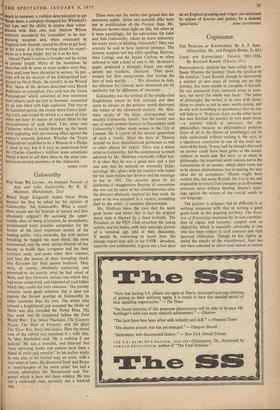Galsworthy
FOR SOME WE LOVED: An Intimate Portrait of Ada and John Galsworthy. By R. H. Mottram. (Hutchinson, 21s.) WHEN Hugh Kingsmill visited Oscar Wilde
I, beyond the Styx he asked for his opinion of Galsworthy. 'Ali, Galsworthy. What a mind! How simple was his formula of success and how absolutely original! By accusing the upper- 11 class of being aristocrats, he immediately d outdistanced every possible competitor for the
f favour of the most important section of the reading public. Very earnestly, but with perfect breeding, he begged the most, timid, the most r sentimental, and the most unreal division of our society to bridle their arrogance and lay their cynicism aside, and make sober their raiment, and beat the hooves of their trampling steeds into flat-irons for their poorer brethren. They were, of course, absolutely enchanted, and promised), to do exactly what he had asked of them, and they forswore curious sins which they had never committed, and repented of mad follies which they could not even conceive.' The parody contains some good criticism, but it does not explain the former prestige of Galsworthy in other countries than his own. The Wilter who refused a knighthood and accepted the Order of Merit was also awarded the Nobel Prize. His best work was all composed before the First World War : The Island Pharisees, The country !louse, The Man of Property, and the plays The Silver Box, Strife and Justice. Here the moral tone of the satirist was sustained if a trifle thin. As Max Beerbohm said, 'He is nothing if not judicial.' He was a moralist, and believed that 'most surviving books and authors have been a blend of artist and moralist.' In his earlier works he was also, in his limited way, an artist, with a true sense of form. He dismissed Scott and Byron as 'word-heapers of the worst order' but had a certain admiration for. Maupdssant and Tur- geniev which is here and there evident. He was not a cultivated man; certainly not a bookish one.
These were not the works that gained him his enormous public. Artist and moralist alike were lost in proliferation of the Forsyte Saga. Mr. Mottram throws some light on this, but often as it were unwittingly, for his admiration for John and Ada Galsworthy, whom he knew intimately for many years, is blinding. Intimately? They can scarcely be said to have inspired intimacy. The famous eyeglass was too often quelling. Harrow, New College and the Junior Carlton, so often referred to with a kind of awe in Mr. Mottram's pages, produced a strangely frigid, one might almost say synthetic, character. 'That quiet, modest but firm compromise, that having the best of both worlds. . . ."His devotion to Ada, his affection for. Conrad, were stimulated not by similarity but by difference of character. . .
Galsworthy was the symbol of the middle-class Englishman whom he first satirised and then came to admire as the postwar world destroyed the values of the nineteenth century. Mr. Mot- tram speaks of 'the large, distinguished and wealthy Galsworthy family,' but the family was one of small yeomen farmers in Devonshire until Galsworthy's father made money in the City of London. He is typical of the second generation of such a family. Since the days of Thomas Arnold we have manufactured gentlemen as well as other objects for export. There was a minor artist in Galsworthy, but the compromise so much admired by Mr. Mottram eventually stifled him. It is clear that he was a good man and a just one and that he enjoyed an unusually happy marriage. His affaire with his cousin's wife lasted for ten years before her divorce and his marriage to her in 1905. The stimulus given by his deliberate if unaggressive flouting of convention (he was cut by some of his contemporaries after the divorce) obviously inspired his best work. As soon as he was accepted as a success, something died in the artist : a common phenomenon.
Mr. Mottram takes the view that his work grew better and, better; but in fact the original sharp tone is blurred by a fond prolixity. The President of the PEN Club' absorbed the young satirist, and his books, with their nostalgic picture of a vanished age, sold in their thousands. It would be interesting to know how this strange export now sells in the USSR : decadent, soporific and sentimental, it gives not a bad slant on an England grasping and vulgar, yet redeemed by echoes of honour and justice; by a skeletal














































 Previous page
Previous page